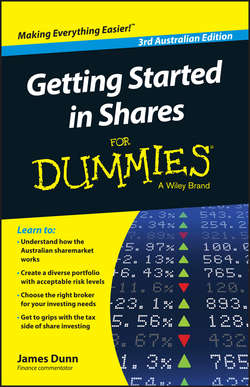Читать книгу Getting Started in Shares For Dummies Australia - Dunn James - Страница 8
На сайте Литреса книга снята с продажи.
Part I
Putting the Share in Sharemarket
Chapter 1
So, You Want to Invest in Shares
Making the Most of Share Investing
ОглавлениеInvesting in shares offers five big pluses. The first two pluses that I discuss in this section are the most critically important. The other three pluses are bonuses, one literally so.
Capital growth
As a company’s revenue, profits and the value of its assets rise, so does the market price of its shares. Subjective factors, such as the market’s perception of the company’s prospects, also play a part in this process. After you’ve looked through this book, you’ll know how to put together a share portfolio that makes the most of this crucial ingredient – capital growth.
Shares are the undisputed champion of capital growth (which I talk about further in Chapter 3). As the magic of compounding interest gets to work on the higher returns generated by shares, your portfolio starts to build wealth at an unmatched rate. The longer you hold your sharemarket investment, the better its performance over any other investment. By following a few basic rules (see the strategies for investment, also in Chapter 3), you can be confident your investment keeps on growing.
Dividend income
Shares may generate for their owners an income, which is called a dividend (a portion of company profits distributed to investors). The dividend is another important method for generating investor wealth. The dividend is paid in two portions: An interim dividend for the first six months of the financial year; and a final dividend for the second half. The two amounts make up the annual dividend. Not every company pays a dividend, but the paying of dividends is a vital part of becoming a member of that elite group of shares known as blue chips.
Franking credits are not dividends paid directly to an investor but arise through the system of dividend imputation, in which shareholders receive a rebate for the tax the company has already paid on its profit. The flow of franking credits from a share portfolio can reduce, and in some cases abolish, your tax liability. (I look at dividend imputation in detail in Chapter 10.)
Shareholder discounts
Recently another reason for owning shares – or more correctly, a bonus for shareholders – has emerged in the form of the discounts companies offer to shareholders on their goods and services. Many companies offer some form of discount, and the number of companies making these offers is growing. These businesses realise that any inducement they can give people to buy their shares makes good marketing sense. Shareholder perks range from holiday deals to wine, shopping and banking discounts. For example, gaming and wagering company Tabcorp offers shareholders free entry into certain horseracing meetings, plus accommodation and food and beverage discounts at the company’s hotels and casinos.
Liquidity
A major attraction of shares as an asset class is that they are extremely liquid, meaning that you can easily buy and sell them. The stock exchange’s trading system, ASX Trade, can match virtually any number of shares put on the market by a seller, with a buyer for that amount of shares. Some shares are less liquid than others; therefore, if you buy unpopular shares, they may be hard to sell.
Divisibility
A share portfolio is easily divisible. If you, the shareholder, need to raise money by selling some shares, you can sell any number to raise any amount. Divisibility is a major attraction of shares as compared to property. You can’t saw off your lounge room to sell it, but you can sell 500 Telstra shares with one phone call – or at the click of a mouse.
